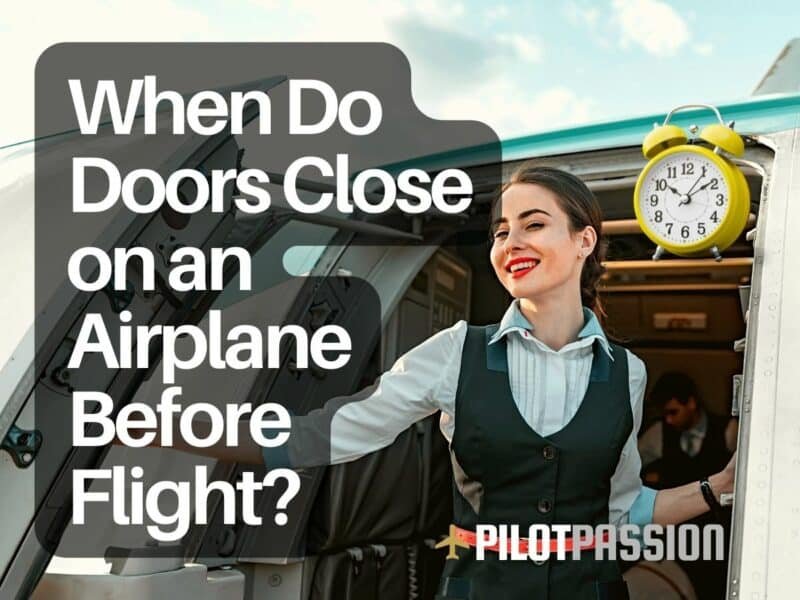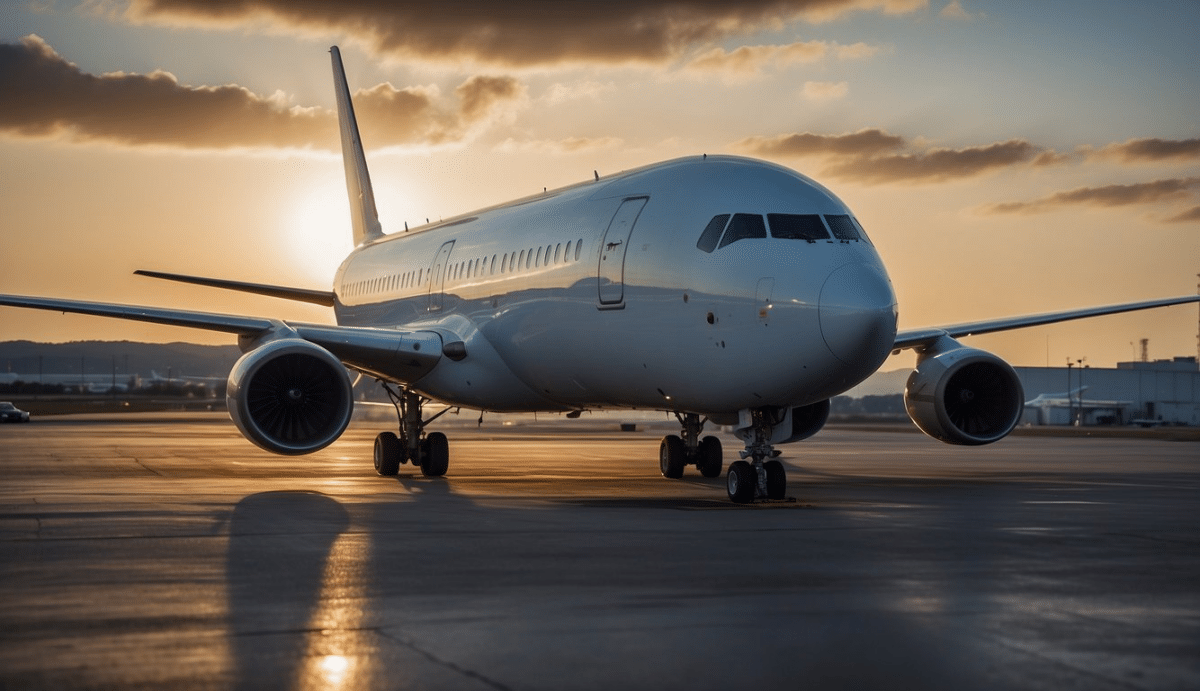Door closure signifies the final call for embarking on a journey skyward. Every minute counts. Whether it’s a dash to the gate or a leisurely stroll to a private jet, the timing is pivotal.
Understanding the nuances can make or break a trip.
When do doors close on an airplane before flight? In most cases, the doors will close 10 to 15 minutes before a flight. Once the doors have closed, you won’t be able to board your flight.
Making sure you leave in plenty of time to ensure you can board your flight is essential. An important thing to remember is that plane crews have very busy schedules to meet, regardless of whether a flight is commercial or private.
Different circumstances dictate when the doors close on commercial or private flights. In addition to private flights being reserved for a distinct, smaller passenger group, there are other considerations to keep in mind.

When Do Doors Close on an Airplane Before Flight – Usually 10 to 15 Minutes Before Departure
In most cases, you should expect the doors to close about ten to 15 minutes prior to departure. Although the last-minute scramble to get to the gate seen in movies isn’t typical of most air travel, one thing you should appreciate is the flight crews don’t have much leeway for stragglers.
Understanding how the boarding process works makes it easier to understand why being on time is essential. Although the process for boarding a private plane can differ from a commercial aircraft, understanding how this process works commercially will help you know why this process is orderly.
How Does the Boarding Process Work on Commercial Flights?
On commercial flights, the boarding process may start 40 to 50 minutes before the flight’s scheduled departure. Unlike private flights, commercial flights have passengers divided into boarding groups, which usually include passengers paying for priority boarding, active-duty military members, and first-class passengers.
Other groups that may be able to board early include seniors, as well as people with disabilities, mainly if using wheelchairs, walkers, or canes. Passengers with small children or babes in strollers may also have access to early boarding.
Because the doors close on most commercial flights about 15 minutes prior to departure, you’ll need to plan on boarding about half an hour before the flight leaves. When you think about the time you have to work with, it’s easy to understand why everyone boards well before departure.
Commercial airlines usually provide a courtesy announcement with the names of passengers who have not boarded before the door closes. However, if a passenger does not get to the gate before this last call, they will likely miss the flight.
How Early Should Passengers Arrive So They Don’t Miss the Doors Closing?
On commercial flights, one of the biggest challenges is allowing enough time for Transportation Security Agency (TSA) screening. Wait times of an hour or more in line are not unheard of at some of the bigger, busier airports, especially during peak travel times.
Many frequent airline passengers recommend allowing at least an hour to get through the TSA in addition to the time required for the boarding process. Arriving two hours before scheduled departure can be a good rule of thumb to follow to avoid delays.
Are There Significant Differences With Door Closures on Private Flights?
The timing for closing the door on private flights is somewhat different from the timing for commercial flights. The check-in process varies from airport to airport, but there are some essential things to keep in mind.
You Don’t Have to Arrive as Early to Make Your Flight
You’ll probably be pleased to know that you need to arrive 10 to 30 minutes before your flight, instead of an hour or more. One of the things that’s an effective stress reliever is not having to spend so much time waiting around.
Because the plane is reserved for your party’s exclusive use, you don’t need to fret about missing the flight. In the event your charter includes other passengers beyond your traveling party, it will be small enough to allow some flexibility during the boarding process.

Fewer Security-Related Hassles
One of the biggest factors on a commercial flight that could impact whether you make it through the door on time is going through security. In most cases, security is tedious anyway, but during busier travel times, getting through security is more time-consuming than usual.
Private flights also require security, but the process is expedited. This process is also more personalized than the screening process on commercial flights, which must account for a larger group of passengers.
Unlike commercial flights, there are no restrictions on the amount of liquids you can bring on board. You also don’t have to go through the process of removing your shoes.
Because the security process is more streamlined due to a smaller group of passengers, the flight crew doesn’t have to impose as many restrictions related to the boarding process. You don’t have to worry about not boarding on time because of security procedures.
Dedicated Charter Flight Terminals to Put You Right There
Airports that host private flights customarily have a terminal dedicated to charter flights known as Fixed-Base Operator (FBO). The FBO area allows private plane passengers to enjoy their expedited check-in.
Because this area is exclusively for private jet charters, you don’t have to think about dealing with the crowds at other terminals. The FBO areas may offer exclusive amenities like eateries, lounges, and restrooms for a more comfortable pre-boarding experience.
Dedicated terminals make it easier for passengers to get ready for boarding in a less stressful environment. You can take advantage of being able to grab a meal or drink without rushing to reach the plane.
More Luggage Options for Fewer Struggles at the Gate
One of the factors that account for the most delays when boarding a commercial flight is the luggage. The restrictions on how much baggage you can bring, weight restrictions, and fees can make the boarding process more time-consuming.
Finding out that an item cannot be brought on the plane is a common reason for delays. Passengers have to prepare for boarding much further in advance, in part, because of these issues.
Private flights have a payload limit, unlike the weight limit found on commercial flights. A payload takes the weight of the passengers and everything they bring aboard into mind.
When you and any other passengers are boarding, the flight crew will make sure everyone and everything is on the plane before closing the door. Having an item in your luggage delaying the flight is unlikely to happen.
Ramp Access Decreases Your Chances of Missing Out
Although not available at all airports, some allow passengers to drive directly onto the tarmac after going through the screening process. This option is a faster way of boarding that also removes many of the stresses associated with commercial air travel.
Travelers who have children or pets with them on their flight often find ramp access a better alternative. One of the advantages of ramp boarding is the flight crew knowing if you might have difficulties with getting anyone onboard.
Many of the common concerns that dictate when doors close on a plane are not an issue on private flights. The greater convenience is a primary reason many prefer private flights to commercial travel.
Final Thoughts
When do doors close on an airplane before flight? For commercial flights, this will be about 15 minutes before departure, although private flights over more flexibility.
Navigating the skies requires a blend of punctuality and knowledge. From commercial hustle to private ease, the door closing moment draws a line.
Embrace the differences, plan with precision. Ultimately, the journey’s success hinges on those final, crucial minutes.
